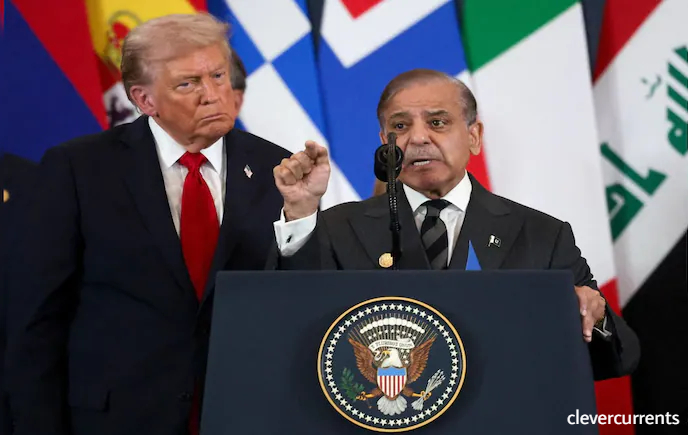The Incident
Pakistani Prime Minister Shehbaz Sharif recently posted a public tribute to Donald Trump. He expressed “deep appreciation” for Trump’s “instrumental role” in advancing peace via initiatives such as the Kuala Lumpur Accord (between Cambodia and Thailand), the Gaza Peace Plan, and efforts in South Asia and the Middle East: “saving millions of lives across the globe.”
That praise did not go unnoticed. Former Pakistani ambassador to the US, Husain Haqqani, responded with a biting comment on X (formerly Twitter):
“Pakistan’s PM still in the lead for Gold in what @FareedZakaria surmised might be the Olympic Sport of flattering Trump.”
Indian politician Shashi Tharoor then reposted Haqqani’s remark, signalling his tacit agreement with the critique.
Why It Matters
Here are several angles that make this seemingly “commentary-on-diplomacy” matter more than just a sound-bite.
1. Diplomacy vs. Public Flattery
When a leader publicly lauds another world figure (especially one as polarising as Trump) and credits them with sweeping achievements (“saving millions of lives”), it raises questions:
-
Is this genuine diplomatic gratitude, or is it seen as over-the-top flattery?
-
Does it serve national interest or domestic optics?
In this case, Haqqani’s metaphor of “Olympic sport of flattering Trump” implies that the praise may have crossed into spectacle rather than sober diplomacy.
2. Perception at Home and Abroad
For Pakistan:
-
Some observers at home criticised Sharif’s remarks as “an insult” or signs of subservience, accusing him of reducing Pakistan’s dignity in global diplomacy.
-
Abroad, especially in India, the commentary becomes fodder for broader narratives about Pakistan’s foreign policy posture. The fact that Tharoor engaged with the critique adds an India-Pakistan dimension.
3. Implications for Regional Politics
-
The claim that Trump played a key role in brokering peace between India and Pakistan, or between Israel/Hamas, is itself contested. For example, Tharoor has argued in the past that external mediation in asymmetrical conflicts may misrepresent realities.
-
Sharif’s praise suggests Pakistan is aligning itself with Trump’s narrative of peace-broker, possibly to gain visibility or leverage. But that can also have risks: over-promising, misaligned expectations, or domestic blowback if citizens feel the praise is misplaced.
Key Quotes & Moments
-
Sharif: “My deep appreciation to President Donald Trump for his instrumental role … saving millions of lives across the globe.”
-
Haqqani: “Pakistan’s PM still in the lead for Gold in what @FareedZakaria surmised might be the Olympic Sport of flattering Trump.”
-
Social media reaction: Some Pakistani commentators labelled the praise as “bootlicking” or “cringe.”
The Broader Context
-
Sharif’s admiration isn’t new: during a peace summit in Egypt, he called Trump “a man of peace,” claimed Pakistan had nominated him for the Nobel Peace Prize, and credited him with stopping a war between India and Pakistan.
-
The Indian side has contested some of Trump’s claims of mediating between India and Pakistan, and Tharoor has weighed in on that debate, saying external mediation implies a false equivalence.
What This Reveals About the Actors
-
Shehbaz Sharif: Wants to bolster Pakistan’s global diplomatic profile, possibly using high-visibility leadership associations. But the risk is that public diplomacy ends up appearing performative rather than strategic.
-
Husain Haqqani: As an experienced diplomat and former ambassador, his critique highlights internal Pakistani unease about too much conspicuous flattery and loss of diplomatic seriousness.
-
Shashi Tharoor: From the Indian side, his reposting suggests he sees the episode as indicative of broader trends in regional diplomacy (flattery, posturing, narrative-control) and chooses to highlight the optics.
Taking It Forward: What to Watch
-
Will Sharif or Pakistan clarify or refine their narrative about Trump’s role? If safeguards are narrow (e.g., only lobbying for the Nobel prize), over-claiming may hurt credibility.
-
How will domestic Pakistani public opinion evolve regarding the praise? If many feel it weakens national dignity, there could be political fallout.
-
Will India use this moment rhetorically (via voices like Tharoor) to contrast its own diplomatic posture vs. Pakistan’s?
-
Could this shape Pakistan’s relationship with the US (and Trump) in future? Heavy public praise might create expectations of reciprocal favour or support — which may or may not be realistic.
Final Thoughts
This episode, while superficially about one public post and one retort, is quite revealing of the mechanics of modern diplomacy: the mix of optics, narrative framing, praise as strategy, and the risk of slide into spectacle.
Politics today isn’t just about policy — it’s equally about presentation. When a leader publicly heaped praise on a former US President and claimed world-saving roles, it triggered both internal (Pakistani) and external (Indian) commentary. Haqqani’s sharp jibe and Tharoor’s repost signal that the world is watching not just what is said, but how it is said.
For Pakistan, the key question is: Does the praise help advance national interests, or does it distract and dilute them? For India and the region, the question is: How should such public gestures be interpreted in the larger game of diplomacy, alliances, and strategic messaging?

